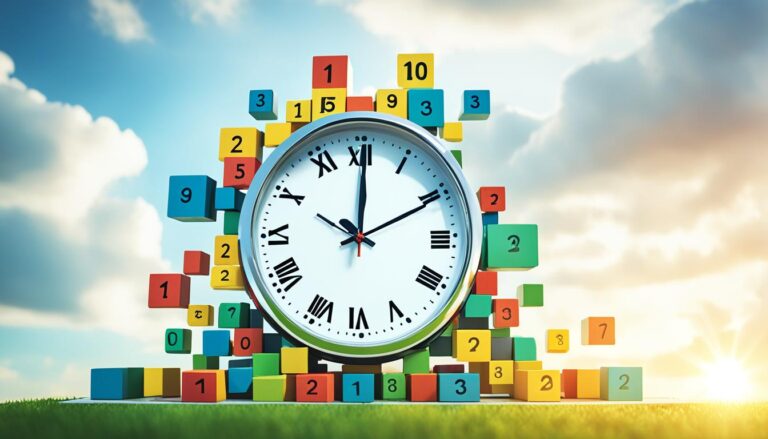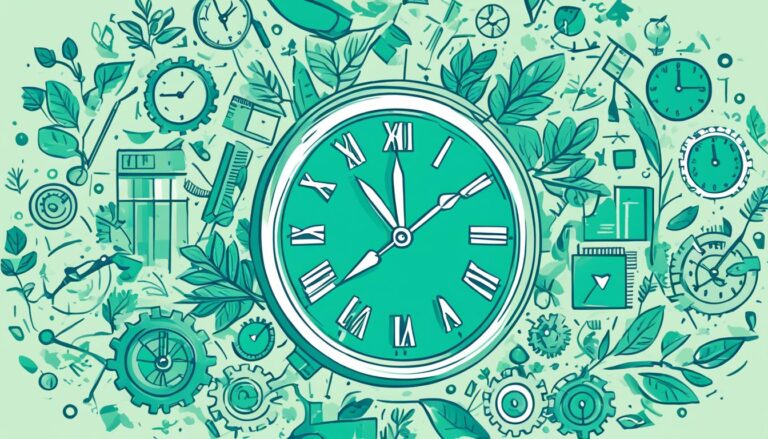Transform Lansing with Smart Waste Management Solutions
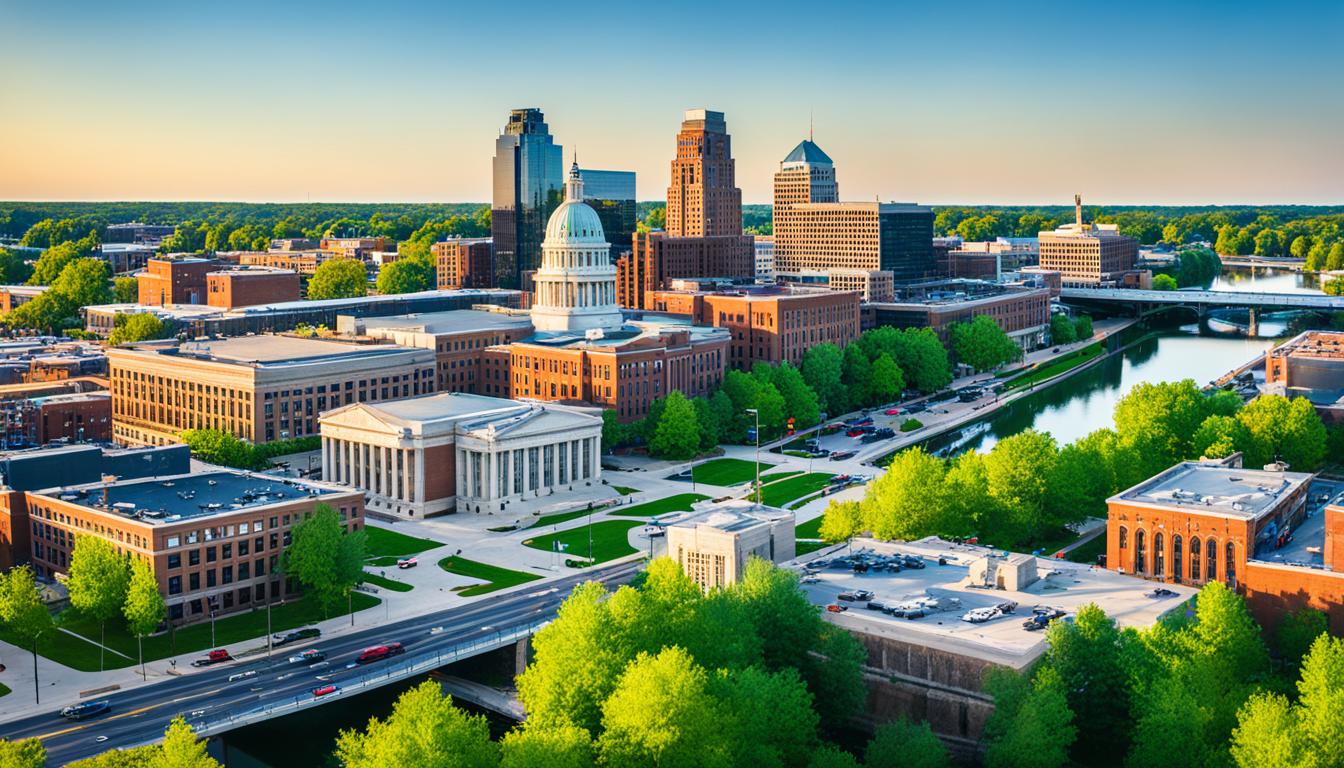
“The greatest threat to our planet is the belief that someone else will save it.” – Robert Swan
Welcome to Lansing, MI, where the journey towards sustainability begins with each one of us. As the need for eco-friendly waste practices becomes increasingly urgent, it is essential for us to take responsibility for managing our waste and creating a cleaner, greener future for our city.
With the support of the City of East Lansing, the Michigan Department of Environment, Great Lakes and Energy (EGLE), and other communities, Lansing is embarking on a transformative journey towards sustainable waste solutions. From enhancing recycling programs to driving positive change in waste management practices, we have the power to make a real difference.
In this article, we will explore the initiatives and projects that are shaping the future of waste management in Lansing. From technology-based recycling programs to innovative waste-to-energy systems, we will discover how these advancements are revolutionizing the way we handle our waste. We will also delve into the role each one of us can play in promoting sustainable practices and creating a more environmentally conscious community.
Key Takeaways:
- Collaboration between the City of East Lansing and various organizations is improving recycling efforts in the community.
- Technology-based approaches, such as camera-equipped recycling trucks, are being implemented to enhance recycling practices.
- Research on waste-to-energy systems, such as anaerobic digestion, is being conducted to convert organic waste into renewable energy.
- Partnerships between Michigan State University and government organizations are advancing sustainable waste management solutions.
- Eco-friendly bathroom remodeling options can contribute to a more sustainable future in Lansing.
Enhancing Recycling with Technology in East Lansing
The City of East Lansing is dedicated to improving recycling practices and reducing waste contamination. In collaboration with The Recycling Partnership and Prairie Robotics, the city is implementing an innovative technology-based approach to enhance its recycling program. By combining advanced camera technology with automated feedback systems, East Lansing aims to educate residents and optimize waste collection services.
Promoting Recycling Excellence
Gone are the days of manual cart tagging. The recycling collection trucks in East Lansing will now be equipped with high-resolution cameras that capture the contents of recycling carts. These cameras ensure accurate monitoring and help identify any contamination, ensuring that only recyclable materials are being collected. By automating this process, the city can streamline waste management and improve the quality of recycled materials.
Providing Personalized Feedback
Residents of East Lansing will receive personalized feedback on their recycling habits. The captured images will be analyzed, and any contamination or improper recycling practices will be identified. Through informative mailers, residents will receive customized suggestions, educational resources, and reminders to help them make better recycling decisions. This personalized feedback aims to educate and empower individuals to become more responsible recyclers.
Educating the Community
The technology-based approach not only enhances waste management practices but also serves as a valuable educational tool. By providing residents with detailed feedback on their recycling habits, the city aims to raise awareness about proper recycling procedures. Through informative mailers, the community will learn about the importance of waste management Lansing MI and how their individual actions can make a significant impact on the environment.
With the implementation of this recycling technology, East Lansing residents can actively contribute to creating a cleaner, greener community. By optimizing waste collection services through advanced camera technology, the city aims to enhance its recycling program and reduce waste contamination.
| Year | Recycling Rate |
|---|---|
| 2018 | 41% |
| 2019 | 48% |
| 2020 | 55% |
Driving Positive Change in Waste Management Practices
When it comes to waste management in Lansing, Michigan, driving positive change is essential for creating a greener and more sustainable future. One key individual leading the way in this endeavor is Dana Kirk, an engineer at Michigan State University.
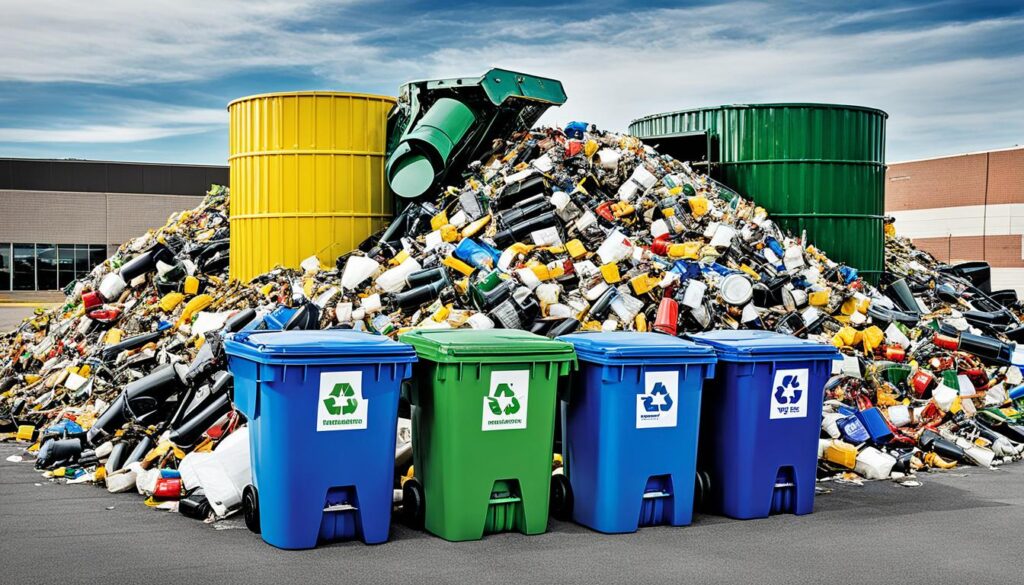
Dana Kirk’s focus is on developing and implementing waste management systems specifically designed for dairy operations. His research aims to maximize farm production and profitability while also preserving natural resources and ensuring environmental sustainability. By optimizing waste management practices, Kirk envisions a future where dairy operations operate efficiently and contribute to a cleaner environment.
In his role, Kirk collaborates closely with government organizations and commodity groups to provide training and programming for waste system management and manure management. This collaborative approach ensures that best practices and innovative solutions are shared across the industry, leading to more effective waste management strategies on a broader scale.
One particular area of focus for Kirk is anaerobic digestion systems. These systems have the potential to convert waste into valuable resources and provide renewable energy for farms. Through his research, Kirk explores the feasibility and effectiveness of anaerobic digestion systems, helping farmers harness the power of waste to benefit both their operations and the environment.
Benefits of Anaerobic Digestion Systems for Sustainable Waste Solutions
The implementation of anaerobic digestion systems offers several advantages for sustainable waste management:
- Conversion of waste into renewable energy
- Reduction of greenhouse gas emissions
- Minimization of odor and water pollution
- Production of nutrient-rich fertilizer
By utilizing anaerobic digestion systems, dairy farms can significantly reduce their environmental footprint while also tapping into a valuable source of renewable energy. This innovative approach to waste management aligns with Lansing’s commitment to sustainable practices and helps drive the city towards a cleaner and more eco-friendly future.
Collaboration for Effective Waste Management Solutions
To achieve meaningful change in waste management practices, collaboration between researchers like Dana Kirk and government organizations is vital. By working together, they can develop comprehensive waste management strategies and implement initiatives that benefit both the environment and the community.
Table: Examples of Collaborative Initiatives for Waste Management
| Collaborating Parties | Initiative |
|---|---|
| Dana Kirk and Michigan Department of Agriculture and Rural Development (MDARD) | Anaerobic Digester Operator Training Program |
| Dana Kirk and commodity groups | Training and programming for waste system and manure management |
Through collaborations and initiatives like these, Lansing can continue to drive positive change in waste management practices, promoting green waste disposal, and advancing sustainable solutions for the benefit of the community and the environment.
The Impact of Anaerobic Digestion Systems
The Michigan State University Anaerobic Digestion Research and Education Center (ADREC) is at the forefront of sustainable waste solutions and eco-friendly waste practices. ADREC focuses on researching and implementing waste-to-energy systems, specifically anaerobic digestion systems. These innovative systems have the power to revolutionize waste management in Lansing, MI, and beyond.
Anaerobic digestion systems work by converting organic waste into biogas through a natural process that occurs in the absence of oxygen. This biogas can be utilized as a renewable energy source, contributing to a more sustainable and eco-friendly approach to waste management.
ADREC provides comprehensive research, professional development, and outreach support for waste-to-energy systems. With a particular focus on small and medium-sized dairy farms, the center aims to assist dairy producers in adopting digester technology and navigating regulatory issues. By promoting the adoption of anaerobic digestion systems, ADREC is driving positive change in waste management practices and paving the way for a greener future.
The Benefits of Anaerobic Digestion Systems:
- Reduces greenhouse gas emissions: Anaerobic digestion systems help to minimize methane emissions from organic waste by capturing and utilizing it as biogas instead.
- Produces renewable energy: By converting organic waste into biogas, these systems generate a valuable source of renewable energy that can be used for electricity generation and heating.
- Reduces dependence on fossil fuels: Utilizing biogas from anaerobic digestion systems reduces the reliance on non-renewable fossil fuels, contributing to a more sustainable energy mix.
- Minimizes waste sent to landfills: By diverting organic waste from landfills, anaerobic digestion systems help to reduce the environmental impact of waste disposal and promote a circular economy.
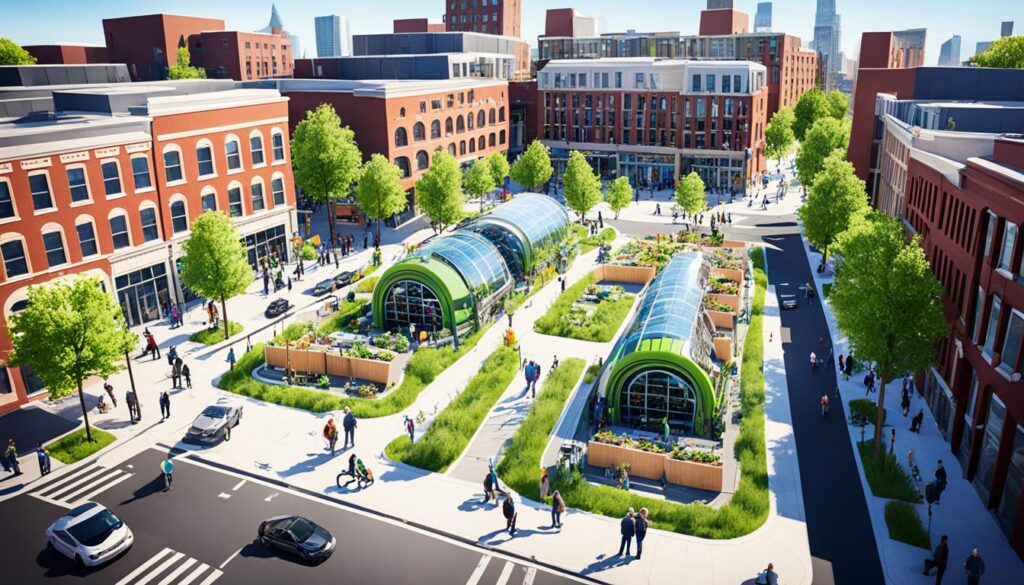
With initiatives like ADREC’s research and education center, Lansing, MI, is taking significant steps towards sustainable waste management and embracing eco-friendly waste practices. These efforts not only benefit the environment but also lay the foundation for a more resilient and sustainable city.
| Benefits of Anaerobic Digestion Systems | Impact |
|---|---|
| Reduces greenhouse gas emissions | Minimizes methane emissions from organic waste, helping to combat climate change. |
| Produces renewable energy | Generates biogas that can be utilized for electricity generation and heating, reducing the dependence on fossil fuels. |
| Reduces dependence on fossil fuels | Using biogas as an alternative energy source contributes to a more sustainable energy mix and reduces carbon emissions. |
| Minimizes waste sent to landfills | Diverts organic waste from landfills, reducing the environmental impact of waste disposal and promoting a circular economy. |
Advancing Sustainable Waste Management Solutions
The partnership between MSU ADREC and government and commodity organizations, such as the Michigan Department of Agriculture and Rural Development (MDARD) and Michigan Farm Bureau, is crucial for advancing sustainable waste management solutions. Together, they collaborate on various aspects to drive positive change and promote eco-friendly practices in waste management.
Collaborative Efforts for Sustainable Waste Solutions
MSU ADREC, MDARD, and Michigan Farm Bureau work hand in hand to:
- Review and analyze data:
- Assessing waste management data and identifying areas for improvement
- Evaluating the effectiveness of existing waste-to-energy projects
- Conduct feasibility studies:
- Assessing the viability of implementing new waste management solutions
- Exploring the potential for expanding waste-to-energy infrastructure
- Develop sustainable infrastructure:
- Designing and implementing waste collection and recycling systems
- Expanding waste-to-energy facilities for optimal resource utilization
- Regulate and oversee waste-to-energy projects:
- Establishing guidelines and regulations for safe and environmentally sound waste-to-energy initiatives
- Monitoring and enforcing compliance with waste management standards
To further enhance waste management practices in Michigan, MDARD collaborates with MSU ADREC in conducting the Anaerobic Digester Operator Training program. This program educates operators on the proper management and maintenance of digester systems, ensuring efficient and sustainable waste-to-energy operations.
Collaboration for a Sustainable Future
The collaboration between MSU ADREC, MDARD, and Michigan Farm Bureau provides a strong foundation for advancing sustainable waste management solutions in Lansing and beyond. By aligning their efforts, they foster innovation, knowledge sharing, and continuous improvement in waste management practices.
Together, they pave the way for a greener future through:
- Optimized waste-to-energy projects
- Enhanced data-driven decision-making
- Improved infrastructure and systems
- Effective regulation and oversight
By working together, these organizations and institutions inspire positive change and build a more sustainable waste management ecosystem in Lansing, Michigan.

Table: Collaborative Efforts for Sustainable Waste Management Solutions
| Partners | Collaborative Efforts |
|---|---|
| MSU ADREC | Research, education, and outreach for waste-to-energy systems |
| MDARD | Data review, feasibility studies, regulations, and waste-to-energy operator training |
| Michigan Farm Bureau | Support and advocacy for sustainable waste management practices |
Promoting Eco-Friendly Bathroom Remodeling in Lansing
When it comes to building a sustainable future, even the smallest changes can make a big difference. Consider revising and remodeling master bathrooms in Lansing with eco-friendly practices in mind. By incorporating sustainable materials and water-efficient fixtures, homeowners can significantly reduce their environmental impact while also saving on utility bills.
The latest trends in bathroom design focus on minimalist and sleek styles that not only exude elegance but also contribute to the preservation of our planet. Embracing technology integration and incorporating natural elements, such as plants and organic textures, can further enhance the eco-friendly ambiance. From eco-friendly flooring made of recycled materials to energy-efficient lighting, every element in an eco-friendly bathroom serves both style and sustainability.
Benefits of Eco-Friendly Bathroom Remodeling
Embarking on an eco-friendly bathroom remodeling journey offers numerous advantages, both for the planet and personal well-being. Consider the following benefits:
- Reduced environmental impact: By using sustainable materials, you contribute to the conservation of natural resources and minimize waste.
- Energy and water savings: Water-efficient fixtures and energy-saving lighting reduce utility bills and conserve precious resources.
- Improved indoor air quality: Choosing low-VOC (volatile organic compound) paints and adhesives can enhance the air quality inside your home, promoting a healthier environment.
- Increased property value: Eco-friendly features are highly desirable in today’s real estate market, making your home more attractive to potential buyers.
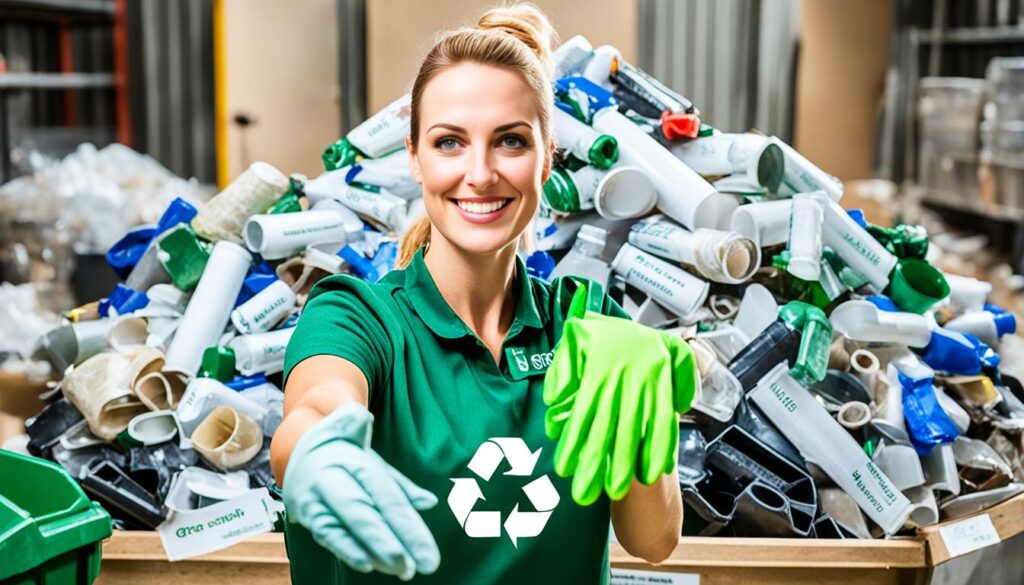
Choosing Sustainable Materials
When remodeling your bathroom, select sustainable materials that are both aesthetically pleasing and environmentally friendly. Consider options such as:
- Bamboo or reclaimed wood: These materials offer a beautiful and sustainable alternative to traditional wood, as they grow rapidly and their use minimizes the need for deforestation.
- Recycled glass: Use countertops and tiles made from recycled glass, which not only adds a distinctive touch to your bathroom but also prevents waste from ending up in landfills.
- Low-flow fixtures: Install water-efficient faucets, showerheads, and toilets to reduce water consumption without compromising performance.
- Natural stone: Choose stones like marble and granite that are locally sourced and responsibly quarried to ensure sustainability.
Achieving a greener and more sustainable future starts with small steps, and eco-friendly bathroom remodeling is a fantastic opportunity to make a positive impact. By embracing sustainable materials, energy-efficient fixtures, and a mindful approach to design, you can create a bathroom that not only enhances your well-being but also contributes to a healthier planet.
| Material | Benefits |
|---|---|
| Bamboo or reclaimed wood | Rapidly renewable, reduces deforestation |
| Recycled glass | Prevents waste, adds a unique touch |
| Low-flow fixtures | Reduces water consumption |
| Natural stone | Locally sourced, responsible quarrying |
Conclusion
In Lansing, you have the power to make a significant impact on waste management. By actively participating in recycling programs and embracing sustainable waste practices, you can contribute to a greener and more sustainable future for your city. Additionally, incorporating eco-friendly elements in your bathroom remodeling projects can further enhance your efforts in waste reduction and conservation.
Initiatives such as the technology-based recycling project in East Lansing, the ongoing research on waste-to-energy systems at MSU ADREC, and the promotion of eco-friendly bathroom remodeling options all play a crucial role in shaping a more environmentally conscious community. With your support, Lansing can become a leader in waste management practices that prioritize both environmental sustainability and community well-being.
Together, let’s elevate our impact and inspire others to follow suit. By embracing eco-friendly waste practices and pursuing sustainable waste solutions, we can forge a path towards a cleaner, healthier, and more vibrant Lansing. The transformation starts with each individual making a conscious choice to prioritize waste management, and together, we can create a city that sets an example for others to follow.


